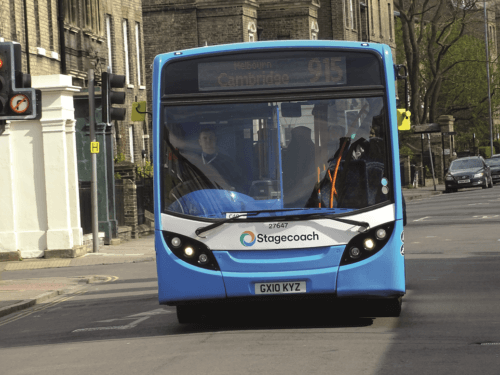A network review will see some routes enhanced but a large number withdrawn in response to changing post-pandemic travel demands
In response to what it called ‘post-pandemic travel patterns,’ and potentially a sign of what is to come elsewhere as operators adjust to the ‘new normal,’ Stagecoach has announced a major review of its routes in Cambridgeshire, prompting significant outcry from locals. The operator said that it will withdraw services where passenger numbers and funding are failing to meet its operational costs, in order to protect the long-term viability of its wider network.
The reshaped and slimmed-down network, which Stagecoach said followed a review that was a requirement of the Government’s provision of pandemic recovery funding, will take effect from Sunday 30 October. Services that the operator said were no longer viable are mainly in the Huntingdonshire and Fenland areas.
The operator said that the network changes will also mean enhancing 12 services across the region, with some services being extended and others seeing frequency improvements.
Government funding support is intended to develop sustainable local transport networks and enable them to continue without further revenue support from central Government. Across the new network in Cambridgeshire, 23 services where operational costs are said to still be challenging even with central Government funding will continue to run, because there is some evidence of increased use. The 18 routes which will not be part of the revised network are said to have seen significant falls in passenger numbers. Stagecoach East Managing Director Darren Roe explained: “The 18 affected routes have been losing £12 per passenger per journey on average. Some of them, where numbers have dropped as low as around only 50 customers per week, are costing up to £80 per passenger. We cannot continue to operate services which we know are no longer financially viable. That would not be right for taxpayers or our passengers. The more people who switch to buses, the stronger our networks will be. It can generate vital investment for more electric vehicles, helps keep fares low and ultimately will help us to expand the bus network to meet new demand.”
Criticism
Responding to the news, Mayor of Cambridgeshire and Peterborough Nik Johnson told ITV News: “We tried to say ‘are you really sure that you want to reduce this, or do you want to come away from the contracts that you have with a combined authority,’ but with the decision that they were to proceed despite actually receiving the bus recovery grant from the Government, I can only say I’m hugely disappointed.”
Secretary of the Cambridge Area Bus Users Group and Cambridge resident Richard Wood added: “There are whole swathes of rural areas who are going to be without a bus service. Over to the east of Cambridge, all the villages, Quy, Bottisham, the Swaffhams, Fordham and so on, are going to be completely cut off from public transport.”
Local Councillor Lorna Dupré added her concerns: “Stagecoach is planning to devastate the bus network in Cambridgeshire and Peterborough which is a lifeline for many residents of our three cities and our market towns as well as our villages,” she said. “Every part of the county will be severely affected by these changes. Most of the routes between St Ives and surrounding villages will be cut. Large villages and towns like Burwell, Soham, Sutton, Melbourn, Bottisham and Godmanchester won’t have a bus service any more. There won’t be a bus route that goes to the major business park at Lynch Wood in Peterborough.
“Residents are worried about how to get their children to school, and fearful for their own jobs if they have no means to get to work. They will be cut off from healthcare, leisure, and retail.”
MP Anthony Browne also expressed concern: “This news will be a hammer blow to those residents who rely on these routes. Having only recently received Government money to keep such services running, it is abhorrent that Stagecoach should consider cutting people’s access to local amenities,” he said.
However, Managing Director Darren said that Stagecoach had been forced to make some very difficult decisions as it couldn’t afford to continue to operate services which it believes are no longer financially viable. He added: “Overall, services are operating at around 75% of pre-pandemic passenger levels, with concessionary travel for older people dropping to as low as 55%. We remain focused on working closely with our local authority partners to make the best use of passenger fares and public investment in services, to deliver the widest and most sustainable network we can for local communities.”
Connectivity Summit
In the wake of the announcement, the operator called for a rural connectivity summit to identify new transport solutions across the county to look for new solutions to help protect the future of local communities. The proposed summit would bring together operators, councillors, transport officials and other local authority and user group representatives.
Darren continued: “We care about our local communities, and we know how important public transport is to local people. That is why we have pumped millions of pounds of company money into services in Cambridgeshire trying to keep these bus links alive, as well as increasing services in areas where people are travelling more.
“It’s clear the traditional field fixed route bus service is no longer a financially viable solution in these rural areas in parts of Cambridgeshire. Not only is it becoming unviable, but it also threatens the long-term sustainability of the wider bus network and the investment we’re making in new electric buses.”
He added that it was inevitable that such services will need to be underpinned by public funding support, and that there needs to be an ‘open and honest conversation’ about the most appropriate way to ensure that communities in rural areas remain connected.
“We are fully committed to playing our part in those discussions,” he added.


